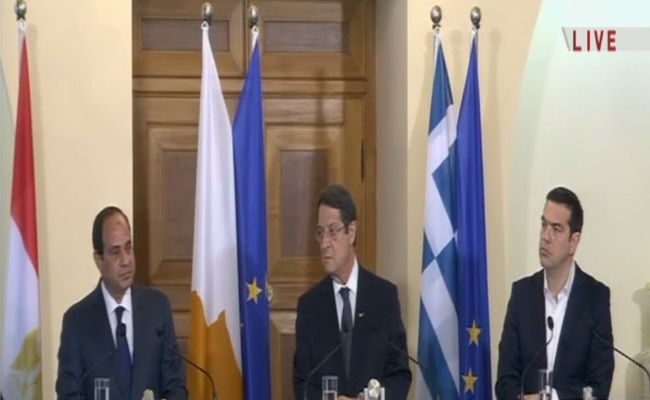By Today’s Zaman
While the leaders of regional actors Greece, Egypt and Greek Cyprus, which have been at odds with Turkey, met in nicosia last week for a trilateral meeting to boost security, energy and economic relations, Turkey is increasingly isolating itself by adding the Turkish Republic of Northern Cyprus (KKTC) to the list of regional actors it has offended.
The KKTC’s new president, Mustafa Akıncı, is expected to arrive in Ankara on Wednesday in his first visit abroad. Immediately after his landslide victory on April 26 — garnering 60 percent of the vote against incumbent President Derviş Eroğlu, who was supported by the Turkish government — Akıncı engaged in a verbal argument with President Recep Tayyip Erdoğan.
Akıncı called for a relationship of equals between Turkey and the KKTC, which is recognized by only Ankara, while EU member Greek Cyprus is recognized as the sole government on the island by the international community.
President Erdoğan told Akıncı to watch his language and reminded him that Turkish Cypriots should not forget Turkey is the motherland that has always taken care of its children on the island. In response, Akıncı asked why Erdoğan doesn’t want Turkish Cypriots to behave like grownups.
Left-wing politician Akıncı is known for his pro-solution stance in the ethnically divided Cyprus, and his landslide victory is an important sign that Turkish authorities should not ignore, particularly at a time when Greek Cyprus is forming a new alliance with the countries that Turkey is at odds with.
Egyptian President Abdel Fattah el-Sisi traveled to Greek Cyprus to meet with Greek Prime Minister Alexis Tsipras and Greek Cypriot leader Nicos Anastasiades last Wednesday. El-Sisi had previously hosted Anastasiades and former Greek Prime Minister Antonis Samaras last November in Cairo, declaring new energy cooperation in the region between the three parties.
Analysts closely following Turkey agree that Ankara’s faulty foreign policy in the region helps the formation of such new friendships and contributes to Turkey’s further isolation. Former Turkish foreign minister and architect of its regional policies Prime Minister Ahmet Davutoğlu’s “zero problems with neighbors” concept has long been a source of mockery in international circles as “zero neighbors,” with Turkey increasing its problematic relations in the region by the day.
Ankara getting into an ugly verbal argument with newly elected KKTC President Akıncı has added to these troubled relationships with neighbors.
During his visit to Greek Cyprus, Tsipras said that Greece would launch consultations with Egypt and Greek Cyprus to establish maritime boundaries in the eastern Mediterranean. Visiting Nicosia’s southern area, Tsipras said the maritime boundaries would be defined in areas where the consent of third countries was not required.
Maritime zones claimed by countries for commercial research, known as economic exploitation zones (EEZ), are normally governed by the United Nations’ Law of the Sea or bilateral agreements between neighboring states that usually settle on an equidistant boundary. Ankara, which is not a signatory to that convention, questions the jurisdiction of Cyprus’s internationally recognized Greek Cypriot government in exploring for oil and gas.
Greek Cyprus has rebuffed Turkish claims and defined its economic zone in 2004. Since then it has delineated its maritime boundaries with Egypt and Israel, where vast amounts of natural gas have been discovered in the past two years.
Turkey and Greece have been at loggerheads for decades over land, air, sea and seabed borders in parts of the Aegean Sea.
After talks with el-Sisi and Anastasiades, Tsipras said, “We agreed on further consultations for defining our sea zones wherever that is deemed necessary, and obviously where it does not require an understanding and cooperation with third countries.”
The three parties have also agreed to step up cooperation on combatting terrorism amid fears over worsening security conditions in the region, including Libya. El-Sisi, Tsipras and Anastasiades agreed to boost defense and security ties and to discuss relevant information to counter terrorist threats. They expressed “grave concern” over a growing terrorist threat in Libya that may destabilize neighboring countries, adding that they support putting in place a counterterrorism strategy that would run in tandem with the ongoing political process.
Commenting on the trilateral summit that took place in southern Cyprus last week, main opposition Republican People’s Party (CHP) Adana deputy Faruk Loğoğlu told Today’s Zaman that the newly formed cooperation between Greek Cypriots, Greece and Egypt is a result of the ruling Justice and Development Party’s (AK Party) faulty foreign policies in the Middle East and the Mediterranean. “We have isolated ourselves in the region,” said Loğoğlu.
The three parties are also working on an option of delivering natural gas from Greek Cyprus via Egypt. Turkey’s Energy Minister Taner Yıldız said over the weekend that delivering Cyprus’ natural gas by way of Egypt is not a feasible option. Speaking to the press, Yıldız pointed to the declining oil prices and high cost of liquefied natural gas (LNG) and said the partnership between the Greek Cypriots and Egypt seems to be a political one rather than an economically feasible decision. Yıldız said the best option to transport the gas in the eastern Mediterranean to European markets would be via Turkey.









